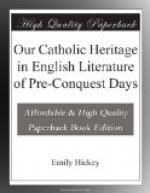About Cynewulf himself we know, I may say, nothing except what we gather from his work. Various guesses have been made, and various theories formed, identifying him with one or other of the men about whom we know something; but for the present, at all events, we must be content to think that he probably lived in the eighth century, and that he probably was a North-countryman. All his writings have come to us in the dialect of Wessex, except some parts of a poem known as the “Dream of the Holy Rood.” These are carved on an old cross, which I will speak of by-and-by, and they are in the Northumbrian dialect; but the manuscript of the entire poem is in West Saxon.
Scholars are working upon old materials and discoveries are being made and theories formed which are at variance with what used to be set down as certainty. The main thing is that we have these poems, and that we want to know about them and learn to prize them. If we want to know them thoroughly and prize them as they deserve, we must take the trouble to learn the language they are written in. But many of us have not time for this, and so must be content, for the present, at least, with making their acquaintance through translations.
Perhaps Cynewulf was a poet who lived as one of the household of some great lord, and wrote more at his ease than if he had been merely an itinerant singer, a “gleeman,” who sang his songs as he went about. He appears, at any rate, to have been an educated man, and I think no one can read his poetry without feeling that he was a man of deep and fervent piety.
There are four poems signed by Cynewulf, and these are named “Christ,” “Juliana,” “The Fates of the Apostles,” and “Elene.” Certain “Riddles” have also been attributed to him.
The poems I am going to bring before you now are the “Elene” and a poem on the Holy Cross, which has been attributed to Cynewulf, and which I for one—and I am not by any means alone in this—love to believe that he must have written. The “Phoenix,” about which we thought in a former chapter, has by some been supposed to be his. Then there is the “Judith,” of which we possess enough to make us recognise it as indeed one of our great possessions; but to-day the two poems I have named will give us enough to think of. To adapt a lovely Scriptural phrase (Judith vii, 7), there are springs whereof we refresh ourselves a little rather than drink our fill. Let us drink, if not our fill, at least a draught long and deep.
We have a church festival, instituted many hundred years ago, the Festival of the Finding of the Cross. Let us hear something of what our old poet sings concerning this in the poem named after the heroine of the finding, St Helena; the poem known as “Elene.”
Cynewulf is one of the poets of the Cross. His poetry is literally stamped with the mark of the Holy Rood. Read over the grand Church hymns, the “Vexilla Regis,” the “Pange lingua gloriosi lauream certaminis,” or recall them in your memory—their Passiontide echoes sound under the triumphant pealing of the bells of Easter—and then be glad that one of your own poets has also sent down the ages the song of his love and his reverence.




